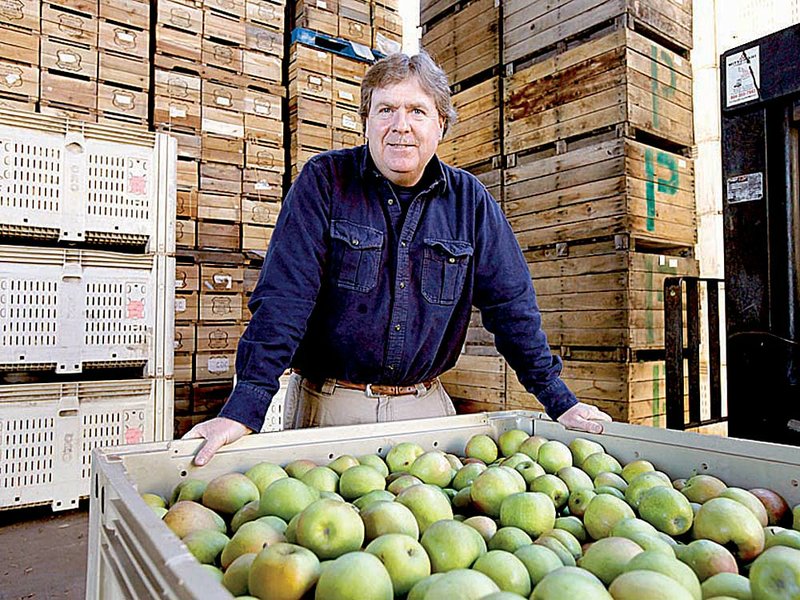RICHMOND, Va. — Henry Chiles, whose ancestors started shipping Albemarle Pippin apples overseas in wooden barrels 100 years ago, has managed without too much trouble to peddle the apples he grows next door to Thomas Jefferson’s Monticello across Europe, Mexico and Central America.
But as the Charlottesville, Va., orchardman expands into his newest market, Cuba, he faces substantial obstacles — ones that will stay stubbornly in place even if Cuba’s top leaders suddenly take a passionate liking to his Pippins.
“Always a lot of challenges, a lot of paperwork, holdups,” said Chiles, 77, patriarch of the family-owned Crown Orchard and Carter Mountain Orchard. “It’s difficult.”
It’s been 12 years since the United States relaxed a trade embargo with the communist nation to allow exports of food and medical products.
But, strings were attached that make doing business cumbersome and expensive. Cuba cannot buy on credit from U.S. companies. And sales must be handled through a third-party bank, since there is no direct banking between the countries.
Chiles and other Virginia farmers nevertheless see great promise in the island, so much so that Virginia Secretary of Agriculture and Forestry Todd Haymore last month led his sixth annual trade mission to Havana. And the commonwealth’s willingness to put up with the hassles seems to be paying off.
While total U.S. sales to Cuba have plummeted by nearly half since the start of the recession — from $711.5 million in 2008 to $363.3 million last year, according to the Commerce Department — Virginia’s have grown. State agricultural exports to the island have shot up from $25 million to $30 million before the recession to $65 million last year. Most of the exports are soybeans, for use in animal feed, and apples, which are regarded as a small luxury.
Those sales make Cuba Virginia’s seventh-largest export market, more than twice as large as 20thranked Britain. And it puts the commonwealth behind just two states — Louisiana and Florida — in trade with Cuba.
Credit trade restrictions became especially onerous during the recession, when a drop-off in European tourism left the already strapped Cuba even more short of cash. That drove Cuba toward suppliers in Asia and South America, said Kirby Jones, president of Alamar Associates, an Arizonabased consulting company that works with companies doing business in Cuba.
“Brazil has offered several hundred million in credits for soybeans. Vietnam and China extended credits to buy their rice,” Jones said. “They have not bought any rice from us in several years. Not a grain.”
But Virginia has been able to expand its business during that period by actively courting the Cubans as other states have pulled back.
“Some of them backed off simply because trade has fallen,” Jones said. “Virginia has been one of the most active. ... The Cuban officials are like anybody else: They like to do business with people they know. ... So many products are so competitive, and they’re priced by the world market anyway. It comes down to two suppliers at basically the same price — that’s where the personal contact becomes very important.”
Reaching out to communist Cuba was not the most obvious course for a conservative state — even when the object was promoting agribusiness. Then-Gov. Mark R. Warner, a Democrat, was itching to lead a Virginia trade mission to the island when he took office in 2002, not long after President Clinton signed the Trade Sanctions Reform and Export Enhancement Act. Warner was dissuaded by advisers who were worried about the appearance of a potential sit-down with Fidel Castro.
Warner settled for dispatching his commerce and trade secretary, who helped commonwealth farmers sell about $800,000 in apples and soybeans to Cuba in 2003 — the first exports from Virginia to Cuba since President John F. Kennedy imposed a trade embargo at the height of the Cold War in 1962.
The job of tending to Virginia-Cuban relations has for the past six years belonged to Haymore, who was agriculture commissioner under then-Gov. Timothy M. Kaine, also a Democrat, before Republican Gov. Robert F. McDonnell made him secretary.
Haymore’s first few trips began with a lecture from Cuban officials on the history of the embargo, which Cubans perceive as a great injustice. Now he enjoys a warm greeting when he attends the annual trade fair in Havana.
“Instead of shaking hands, you’re high-fiving them, hugs,” he said. “They want to see the pictures of your families. They want to know, ‘How old are your girls now?’”
Virginia growers send their own representatives and brokers to the trade fair to negotiate with Alimport, the Cuban government’s food procurement arm. But Cuban government officials expect an American counterpart to be in on the deal at some level — sometimes to help negotiate, sometimes merely to play the role of official-looking “wallflower,” Haymore said.
On his second trip, Cuban officials insisted that he sign each page of the contract before an export deal was finalized.
“I’ll be honest, it was a little bit intimidating. I wasn’t expecting to sign it,” Haymore said. But he eventually did so — not as a party to the transaction, but “more as a witness, putting the official Virginia stamp on the deal.”
Chiles, like other Virginia farmers, thinks eventually the red tape will go away, either because of changes in Cuba or in U.S. policy. He’s willing to contend with it now to get a foot in the door.
“We know sooner or later that Cuba will open back up again,” Chiles said. “It’s a market that’s close to us. It makes sense for us to export as close to home as we can. ... You want to make something work, you can usually find a way.”
Business, Pages 61 on 12/02/2012
